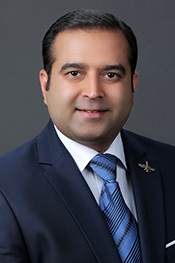Arslan Munir | Adjunct Associate Professor
University Outstanding Scholar
 Post-Doctorate, 2014 - Rice University, Houston, Texas
Post-Doctorate, 2014 - Rice University, Houston, Texas
Electrical and Computer Engineering
Ph.D., 2012 - University of Florida, Gainesville
Electrical and Computer Engineering
M.A. Sc., 2007 - University of British Columbia, Vancouver, Canada
Electrical and Computer Engineering
B.Sc., 2004 - University of Engineering and Technology, Lahore
Electrical Engineering
Contact information
785-532-6350
2162 Engineering Hall
amunir@k-state.edu
Personal Website
Professional experience
Arslan Munir received a master’s degree in electrical and computer engineering from the University of British Columbia in 2007 and a doctorate in electrical and computer engineering from the University of Florida in 2012. He was a postdoctoral research associate in the electrical and computer engineering (ECE) department at Rice University, Houston, Texas, from May 2012 to June 2014. He worked as a visiting graduate research student at the University of Toronto for one semester while completing his doctorate. From 2007-2008 he worked as a software development engineer at Mentor Graphics Corporation, embedded systems division.
From 2014-2017 Munir was a tenure-track assistant professor in the department of computer science and engineering at the University of Nevada, Reno. He joined the computer science faculty at K-State in 2017 as a tenure-track assistant professor and a Michelle Munson-Serban Simu Keystone Research Faculty Scholar. He was promoted to associate professor with tenure in 2021.
Research
Munir’s current research interests include embedded and cyber-physical systems, secure and trustworthy systems, computer architecture, artificial intelligence (AI), computer vision, parallel computing and fault tolerance. He is a founding director of the Intelligent Systems, Computer Architecture, Analytics and Security (ISCAAS) Laboratory at K-State. His current research projects include design of secure and dependable autonomous vehicles and intelligent transportation systems, AI-assisted spacecraft trajectory optimization and planning, and AI-enabled situational awareness. His research accomplishments have been covered by various news and media outlets.
Research keywords
Embedded and cyber-physical systems, secure and trustworthy systems, hardware-based security, computer architecture, parallel computing, artificial Intelligence, computer vision, data analytics, fault tolerance
Academic highlights
Munir has been the recipient of many academic awards including the doctoral fellowship from the Natural Sciences and Engineering Research Council (NSERC) of Canada. He earned gold medals in electrical engineering and academic roll of honor for securing rank one in pre-engineering provincial examinations out of approximately 300,000 candidates.
He has published more than 70 scholarly peer-reviewed articles related to his research interests, with two of his research papers receiving Best Paper Awards and two more being selected as Best Paper Finalists. He published a book on modeling and optimization of parallel and distributed embedded systems in Wiley-IEEE in 2016. He also holds three U.S. patents.
He has served as a program committee member and a reviewer for various IEEE and ACM conferences; a reviewer for various IEEE, ACM and Elsevier journals; and a reviewer for National Science Foundation panels. He has served on the technical program committee of several conferences including ACM GLSVLSI, IEEE ICCD, IEEE iNIS, IARIA ICNS, IEEE CloudNet, IEEE MCSoC and IEEE/IFIP EUC. He served as a session chair at the IEEE International Conference on Consumer Electronics (ICCE) in 2020, and a special sessions chair at the IEEE International Symposium on Smart Electronic Systems in 2021. He currently serves as an associate editor for IEEE Consumer Electronics Magazine. He is a senior member of IEEE.
His research has been sponsored by the National Science Foundation (NSF), Air Force Office of Scientific Research (AFOSR), Air Force Research Laboratory (AFRL), National Aeronautics and Space Administration (NASA), and Semiconductor Research Corporation (SRC). He has been recognized with an NSF Computer and Information Science and Engineering Research Initiation Initiative award. He has also been awarded Summer Faculty Fellowships at AFRL, Information Directorate (RI) in 2019, 2020 and 2021.